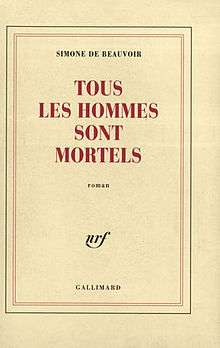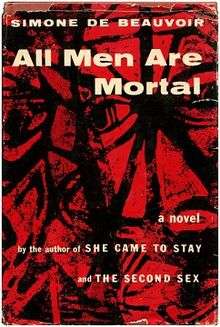All Men Are Mortal
 Cover of the first edition | |
| Author | Simone de Beauvoir |
|---|---|
| Original title | Tous les hommes sont mortels |
| Country | France |
| Language | French |
| Genre | Metaphysical novel |
Publication date | 1946 |
| Media type | Print (Hardback & Paperback) |

All Men are Mortal (French: Tous les hommes sont mortels) is a 1946 novel by Simone de Beauvoir. It tells the story of Raimon Fosca, a man cursed to live forever. The first American edition of this work was published by The World Publishing Company. Cleveland and New York, 1955. It was adapted into a 1995 film of the same name.
Plot
Regina is a young theatrical actress. Her career seems to be promising and her reputation becomes wider with every tour and performance. But she is not content. The sparks of attention in the eyes of her audience seem fleeting and the praises seem typical rather than unique. She can not accept herself sharing their attention and regards with her co-star Florence.
Following a performance in Rouen, Regina chooses to stand aside from her theatrical troupe and starts an internal monologue concerning her uniqueness, or lack thereof, among other women. She keeps comparing herself to Florence and focusing on the current love life of her fellow actress. She bitterly acknowledges that Florence is probably not thinking about her and neither are the other people around her. Then she notices another man who seems to pay little attention to her, Raymond Fosca.
Fosca is described as a reasonably attractive with a crooked nose, tall and athletic, seemingly young but with a passionless face and empty eyes that remind Regina of her father in his deathbed.
Soon enough Regina finds that Fosca resides in the same hotel as her theatrical troupe. He has piqued the curiosity of the staff and several visitors for his peculiar habits. He had been staying in the hotel for a month but hardly spoke to anybody and appeared deaf to any attempts to speak to him. He spent his days in the garden, sitting in silence even in rain. He never changed clothes and no one had seen him eat anything.
A curious Regina enters his room in his absence and finds release papers from an asylum, claiming the man suffered from amnesia and was incarcerated for an unknown amount of time. He was considered harmless and released a month before. She decides to use the information to approach Raymond Fosca. However Fosca is not in the mood for conversations. Regina asks him for a way to escape her boredom. He only asks how old the actress is. He takes her report of being twenty-eight-years-old and estimates she has about fifty more years to endure. Then she would be free of boredom.
Despite his warnings to stay away from him, Regina makes a habit of visiting him. Fosca comments that due to her time has started flowing for him again. Already the man leaves the hotel for the first time in a month to satisfy a new craving for cigarettes. He starts confiding in her and explains that he has no amnesia. Far from it, he remembers everything from his life. Even his thirty years in the asylum.
Regina visits the man daily but then tires of him. The theatre company leaves Rouen and she leaves Fosca without a word. She returns to Paris and starts negotiations for a career in the Cinema of France. But only three days later, Fosca has followed her home. She is the only person to currently hold his interest and makes clear his intention to keep following her. He wants to watch and listen to her before she dies.
Regina mocks Fosca at first for stalking her, and then worries about his surprising resolve at following her, despite her attempts to get rid of him. Their discussions soon turn to her passion for life and her mortality, while Fosca first hints at his own immortality. She finds it fascinating that a man does not fear death even if the man seems to suffer from his own brand of insanity.
Regina contemplates his state of mind and even starts discussing it with the other persons in her life. Fosca soon enough proves his immortality by cutting his own throat with a razor in her presence. At first a stream of blood flows from his throat and the man seems to be dying. But moments later the flow stops, the wound starts closing without treatment and Fosca heals at an incredible rate. He seeks a new start for himself, to feel alive again by her side.
Regina is touched, but has another motive to return his affection. In ten thousand years, she thinks, Fosca could still be alive remembering her, long after her own death. Another suitor comments that she would be one memory among many, one butterfly in a collection. But Regina pursues her new immortal lover and even enjoys tutoring him at living again.
However she finds herself unable to understand him and his indifferent behavior to many aspects of modern life. Seeking to understand him, Regina demands to listen to his own life story which presumably shaped his perceptions. Fosca has to agree and his narration begins.
Fosca was born in a palace of the fictional Carmona, Italy on 17 May 1279. His mother died shortly after his birth. He was raised by his father and trained in equestrianism and archery. A monk was hired to indoctrinate the boy to the beliefs of the Roman Catholic Church but Fosca proudly proclaims never caring for anything beyond this Earth and never fearing God or man.
He idolized his handsome and strong father and resented that Carmona was instead governed by Francois Rienchi. He was bow-legged and fearful for his own life. The people hated Rienchi and the Duke of Carmona was said to not make a step without his chainmail armor and at least ten guards. Fosca describes him being greedy and having his private chest of gold, kept full by unpopular methods. One by one the nobles of Carmona were accused of treason and executed by hanging or decapitation. Their fortunes were confiscated and provided more gold for Rienchi, as did the heavy taxation of the lower classes. Many lived in hovels and people begging for money and food were commonplace.
Fosca considered Francois Rienchi responsible for the misery of Carmona. But Francois eventually died, succeeded by his own brother Bertrand Rienchi. Rumor had it that Bertrand had poisoned his brother but Carmona celebrated the change of Dukes. But the chest of gold was always empty and Bertrand had to fill it by following in the footsteps of his brother. He had promised no more public executions but now the nobles and wealthy traders of Carmona withered away in prison. Their fortunes were still confiscated and heavier taxes were added to the old ones. The people now hated Bertrand Rienchi.
The main tension exists between the meaningless of daily life, rituals, style from the perspective of an immortal man contrasted by the seeming trivial concerns of a mortal woman: the importance and the value they put on things are at opposite ends of the spectrum. From his perspective everything is essentially the same. From her perspective even the most trivial is unique and carries significance.
Reception
All Men are Mortal is identified as a "metaphysical novel" by Beauvoir's biographers Claude Francis and Fernande Gontier, who note that while it did not sell well, it was almost immediately translated into German.[1]
See also
- The Wandering Jew a series of old legends about a Jew who is made immortal in the time of Jesus and cursed to wander the Earth until the second coming.
References
- ↑ Francis, Claude & Gontier, Fernande. Simone de Beauvoir. Sidgwick & Jackson, 1987, p. 218.